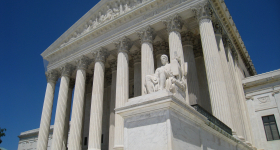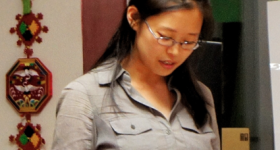Originally posted at New America Media.
by
‘The times they are a changing.' The year 1964 witnessed the launching of a momentous student movement for free speech that to this day is still associated with the university -- Berkeley -- that gave birth to it. Flash forward to February 2010 and the University of California is again at the center of the free speech debate -- this time at Irvine.
On February 8, 2010, at a university-sponsored, on-campus speech by current Israeli Ambassador to the United States Michael Oren, 11 UC Irvine and UC Riverside students rose up in turn to speak out against Israel’s wars in Gaza and its treatment of Palestinians.
Unlike their Berkeley predecessors, the Irvine 11, as they are now known, did not number in the thousands, nor did they refuse to cooperate with university authorities. Rather, they chose to practice their constitutionally guaranteed right to express themselves in a public forum.
A court last week found 10 members of the group guilty on two misdemeanor counts each of disturbing a meeting and conspiring to disturb a meeting.
Conspirators of Free Speech
"The defendants in this case conspired to shut down another person's ability to speak," says Susan Kang Schroeder, chief of staff of the Orange County District Attorney’s (OCDA) Office, and authorized spokesperson for District Attorney Tony Rackauckas, who headed the prosecution of the students.
Kang Schroeder, a Korean American who is the wife of former California GOP chairman and current OCDA political adviser Mike Schroeder, says that when the 11 students chose to speak up against Oren, "their conduct was criminal."
The 10 students on trial (one student negotiated a plea bargain in July) -- Mohamed Mohy-Eldeen Abdelgany, 24; Khalid Bahgat Akari, 19; Aslam Abbasi Akhtar, 24; Joseph Tamim Haider, 23; Taher Mutaz Herzallah, 21; Shaheen Waleed Nassar, 21; Mohammad Uns Qureashi, 19; Ali Mohammad Sayeed, 24; Osama Ahmen Shabaik, 22; and Asaad Mohamedidris Traina, 20 -- and their lawyers disagree.
"We believe that these students acted in a way that was customary and in a way that students have traditionally acted historically," says Reem Salahi, a lead defense attorney in the case.
"The intention of the protest was far from shutting the speaker down but was rather a means of sending a message to this individual and expressing their dissent about the individual and the policies his state engages in, particularly in that time in history following the Gaza assault."
Israeli military action against Gaza escalated in 2006 and 2007, leading to the December 2008 and January 2009 conflict known as the Gaza War, in which an estimated 1,100 to 1,500 Palestinians were killed in a three-week period. A United Nations Gaza Fact Finding Mission later condemned Israel for using “disproportionate force” against the civilian population.
The student protest, organized by the Muslim Student Union, Riverside Chapter, was, according to the students, an attempt to draw attention to those events, not to prevent anyone’s free speech. In fact, according to Salahi, Oren completed his speech ahead of his planned departure time of 7 pm (according to court documents) and voluntarily left just after a mass walkout occurred at approximately 6:47 PM in order to make his way to a Los Angeles Lakers game.
But according to Section 403 of the California Penal Code (CPC), "Every person who, without authority of law, willfully disturbs or breaks up any assembly or meeting that is not unlawful in its character … is guilty of a misdemeanor.”
Where the distinction lies, however, between legitimate protest and willful disturbance remains unclear to all but the most lawyerly of eyes.
"We don't believe that the law is constitutional," Salahi says of CPC Section 403.
The judge and jury in this case felt otherwise, ruling that the students' vocal expressions of opposition to Oren and his state's policies constituted a disturbance. In addition to the two misdemeanor counts, each was penalized with 56 hours of community service and three years of probation.
High Priority Case
Salahi says she and her team were surprised by the importance the county in particular placed on winning this case. "There is clearly something different about this case. This prosecution was very unique in the level and amount of funding, time and resources that the OCDA put into it," she says.
According to Salahi, not only were numerous university administrators and students brought in to testify -- including students who weren't even in attendance at the event -- but two additional DA investigators "went around town questioning individuals and trying to obtain information from them about the protest, and on top of that, the DA had the head of the homicide unit try this misdemeanor case."
And then there were the five search warrants which were used to obtain thousands of pages of emails, including "approximately 20,000 pages of emails that contain attorney-client information," according to Salahi.
Kang Schroeder says the emails in particular were necessary for the prosecution to prove its "conspiracy" point. "[Oren] was shut down because he was an Israeli and that's what it says in their emails."
But Salahi found the push to obtain the emails "very troubling," especially when it came to the issue of privacy. "It's one thing to have a university deal with their students internally. It's another thing to have the power of the state and the resources of the state pursue this prosecution in the manner that they did and obtain emails to compel testimony."
The Ethnicity Question
"America is my home," says Taher Mutaz Herzallah, one of the Irvine 11 students, and a senior at UCR who is due to graduate with a degree in Political Science and International Relations in December 2011. "I'm just taking part in the American traditions that we all cherish, relish, and value -- the American tradition of protest and dissent."
Herzallah and the other nine defendants were all from Muslim families: Palestinian, Arab, Pakistani, with one student is half-Thai. "They are of different ethnic origins but they are all Americans," Salahi says.
"It's really a shame to be criminalized in this way,” said Herzallah, “but we definitely don't feel like we're outsiders."
Kang Schroeder insists the case had "nothing to do with the content of what they were speaking and who they were, what ethnicity. It was about shutting down another person's ability to speak."
On that point, both sides agree. The question is, whose freedom of speech was violated: the students who were removed by security, one by one, or the foreign ambassador who finished his speech?
"I think the university should really appreciate the fact that they still have students who want to be active on political issues, who are thinking -- not just in the classroom but outside the classroom -- and are taking initiative," Herzallah says. "It's a very dangerous precedent they've set."









Comments